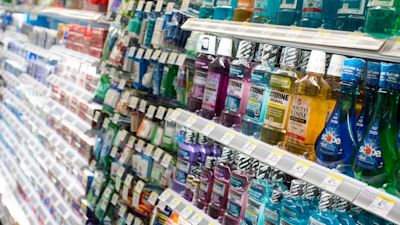Mouthwash 'kills Covid in 30 seconds', Cardiff laboratory tests find

A Cardiff study has found mouthwash can eradicate Covid-19 within 30 seconds of being exposed to it in a laboratory.
It comes ahead of a clinical trial into whether using over-the-counter mouthwash has the potential to reduce the levels of the virus in a patient's saliva.
The Cardiff University report revealed that mouthwashes containing at least 0.07 per cent cetypyridinium chloride (CPC) showed "promising signs" of being able to combat the virus.
It supports another study that found CPC-based mouthwashes are effective in reducing the amount of virus that an infected individual is producing.
The latest test was carried out by scientists at the university's laboratory and mimicked the conditions of a throat/nasal passage using an over-the-counter mouthwash brand.
A clinical trial will now examine how effective mouthwash is in reducing the viral load in the saliva of Covid-19 patients at the University Hospital of Wales in Cardiff.
The results are due to be published early next year.
Dentyl is the only UK mouthwash brand to take part in the 12-week clinical trial, which is led by Professor David Thomas from Cardiff University.
Dr Thomas said: "Whilst these mouthwashes very effectively eradicate the virus in the laboratory, we need to see if they work in patients and this is the point of our ongoing clinical study.
"It is important to point out the study won't give us any direct evidence on viral transmission between patients, that would require a different type of study on a much larger scale.
"The ongoing clinical study will, however, show us how long any effects last, following a single administration of the mouthwash in patients with Covid-19."
Dr Nick Claydon, a specialist periodontologist, said he believed the research was "very valuable".
He said: "If these positive results are reflected in Cardiff University's clinical trial, CPC-based mouthwashes such as Dentyl used in the in-vitro study could become an important addition to people's routine, together with hand washing, physical distancing and wearing masks, both now and in the future."